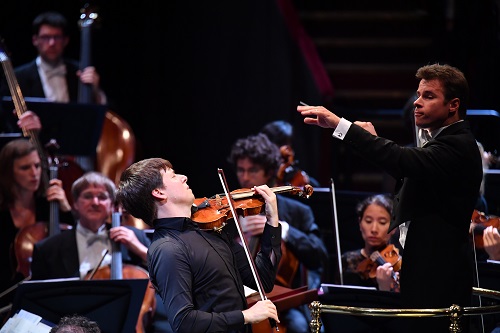 United Kingdom BBC PROM 2 – Dvořák and Smetana: Joshua Bell (violin), Bamberg Symphony Orchestra / Jakub Hrůša (conductor), Royal Albert Hall, London, 20.7.2019. (AS)
United Kingdom BBC PROM 2 – Dvořák and Smetana: Joshua Bell (violin), Bamberg Symphony Orchestra / Jakub Hrůša (conductor), Royal Albert Hall, London, 20.7.2019. (AS)

Dvořák – Violin Concerto in A minor Op.53
Smetana – Má Vlast
When Semyon Bychkov became Artistic Director and Chief Conductor of the Czech Philharmonic Orchestra last year there were those who felt that Jakub Hrůša was unlucky not to have been appointed instead of him. On the evidence of having heard both conductors I would agree with this. However, Hrůša, now approaching his 39th birthday, surely has time on his side to scale the ultimate conducting heights: he has been Chief Conductor of the Bamberg Symphony Orchestra since 2016 and is Principal Guest Conductor of the Philharmonia Orchestra. As a consolation prize, perhaps, he is also Principal Guest Conductor of the Czech Philharmonic. If the implication from this information is that the Bamberg Symphony Orchestra plays at a slightly lower level of excellence than the great European ensembles then I think that may be a fair judgement. It is, however, a highly efficient, well-disciplined ensemble with very good wind players in all departments. Like many ensembles these days it contains players of all nationalities and doesn’t have a particularly individual character. Its roots as the German Philharmonic Orchestra in Prague, disbanded by the Czechs after the Second World War and re-formed in the German town of Bamberg have long been washed away.
The still youthful, even boyish appearance and demeanour of Joshua Bell belies the fact that he is now over 50 years old. Time has not diminished the open-hearted enthusiasm or energy he has always possessed, and as expected his approach to the Dvořák concerto had an appealing freshness and sense of re-discovery: the work is very much in his repertoire and he recently told a Pittsburgh reporter that he was in love with it, especially the central slow movement. And so it seemed on this occasion. His was a beautifully lyrical account of the work, the composer’s characteristically yearning emotional quality finely caught and the catchy rhythms of the finale in particular having a delightfully light-hearted, bouncy quality. Not unexpectedly, Hrůša and the orchestra responded wholeheartedly to Bell throughout the performance. As an encore Bell played Dvořák’s Cavatina for two violins and viola with the orchestra’s leader and the principal viola.
Smetana’s Má Vlast, which Hrůša and this orchestra have recorded together (review), must be a difficult work to bring off satisfactorily. Its sheer length, its phases of bombastic nationalistic statements and repetitive sequences need careful handling. In the wrong hands some parts of it can sound dull, but not on this occasion. At the beginning of the opening movement, ‘Vyšehrad’, Hrůša naturally let the introductory harp solos have their say without supervision, but the acutely sensitive manner in which he then shaped the following wind phrases suggested that we were in for something special, and so it proved to be. Every aspect of the movement’s emotional ebb and flow, managed with masterly control of tempo and rhythmic changes, was perfectly pointed. In the next section the Vltava flowed with exquisite grace, the contrasting riverside activities charmingly brought to life. The sharpest of attacks at the beginning of ‘Šárka’ began a highly charged representation of the tale of the vengeful woman who lured men to their death: the final massacre was portrayed very excitingly. Then came another contrast in ‘Z českých luhů a hájů’, better-known as ‘From Bohemia’s woods and fields’, with its splendid evocation of a panoramic landscape and country activities, lovingly evoked by Hrůša and his players. Back to a depiction of historic conflict between Bohemian Protestants and the Catholic Holy Roman Empire in ‘Tábor’, the defiant Hussite chorale strongly projected. Not even Hrůša could quite save the last and unfortunately the weakest movement, ‘Blaník’, with its bombast and shambling construction. But its loud ending produced a predictable ovation for what was a quite outstanding performance. A black mark to the programme annotator, who described an element of ‘Blaník’ as being like a precursor of “Wolf-Ferrari’s Donna Diana Overture” (sic).
At the end of a long evening the orchestra and Hrůša gave the audience encores in the shape of the Polka and Furiant from Smetana’s opera The Bartered Bride. If by then the playing had lost a little of its sharpness who could blame the performers, who had given their all for their richly talented conductor in Má Vlast.
Alan Sanders